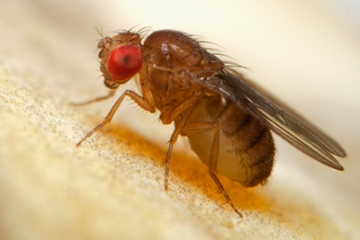Research Highlights
Study of fruit flies finds hunger causes brain changes that slow aging
Diet affects lifespan but hunger itself also can increase longevity. In Drosophila melanogaster — fruit flies — feeling hungry can increase lifespan because of changes in the brain, according to a new NIA-funded study published in Science.
For this study, researchers from the University of Michigan promoted hunger in Drosophila in two different ways. First, they fed the flies food low in branched-chain amino acids (BCAAs), which are essential amino acids that the body does not make but which come from food. In both flies and mammals, decreasing BCAA in food is known to increase hunger. Flies were fed low- or high-BCAA food. The flies on the low-BCAA diet showed behaviors of hunger, such as eating more food and consuming more calories but lived longer than the high-BCAA food group.
Hunger was also induced by stimulating neurons in the brain associated with hunger through genetic manipulations. The flies with activated hunger neurons ate twice as much but lived longer, compared with those whose neurons were not activated.
ADS
Further experiments suggest a connection linking branched chain amino acids, hunger-controlling neurons, and lifespan. Many of these neurons — in the fly brain — use the neurotransmitter serotonin to communicate with other cells; this neurotransmitter is linked to control of body temperature, sleep, learning, and hunger, among other functions in humans.
Additionally, the researchers found that hunger activated through the low-BCAA diet caused epigenetic changes to DNA in the brain. They found that the low-BCAA diet modified the histones in “hunger neurons.” These can lead to changes in which genes are expressed and those changes impact physiology — in this case, hunger — but link hunger to longevity. These results suggest that the brain circuits that link hunger to aging may reset appetite levels and that this process is observed in other life-extending diets, such as low protein and intermittent fasting.
Overall, the study provides new insights into the mechanisms that drive hunger and control longevity in fruit flies and, potentially, in other species. More research is needed to understand which genes change because of hunger, whether this affects only specific types of neurons, and how those changes affect the brain and lead to slower aging.
ADS
This research was supported in part by NIA grants R01AG051649, R01AG030593, and R01AG063371.
These activities relate to NIH’s Alzheimer’s and Related Dementias Research Implementation Milestone 2.A, “Disease Mechanisms: Mechanisms of vulnerability and resilience.”
Reference: Weaver KJ, et al. Effects of hunger on neuronal histone modifications slow aging in Drosophila. Science. 2023. Epub May 12. doi: 10.1126/science.ade1662.



